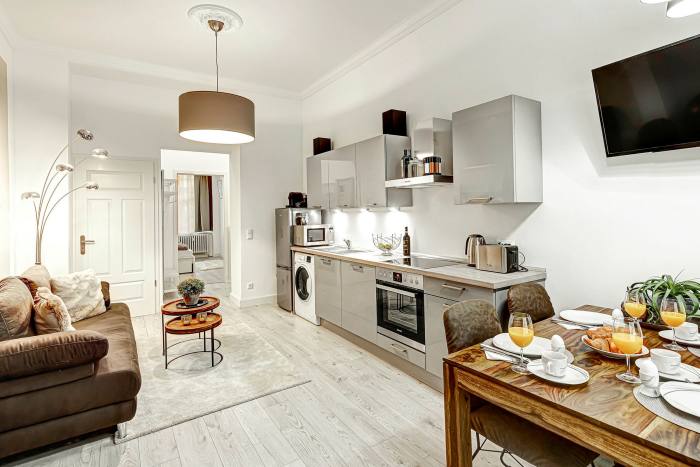5 Things to Know Before Renting an Apartment in Berlin

Being a resident in Berlin is fantastic. One of the greatest areas to live in Berlin is as close to the city centre as you can, whether you are running a business, doing freelance work, working online, or simply leading a nomadic lifestyle. This entails being close to all the top spots to eat, drink, socialise, and generally have a good time while still being surrounded by the bustling energy of the city.
Table of Contents
1. How to Find a Place to Stay in Berlin
Finding the ideal apartment in Berlin depends on a variety of factors, including your expat background and the neighbourhood itself, but the most crucial one is the appropriate attitude.
Berlin’s rental market is tough. It’s customary to wait for real estate agents to react to your enquiries for apartments. Yet this is an outdated error. Today, there are several options to look through Berlin’s rental listings and available flats, such as UrbanGround, which currently has more than 1,000 homes ready and waiting for you. This implies that you are free to seek flats and move in as soon as your request has been accepted and the first month has been paid.
Use your digital nomad abilities to find your virtual house instead of getting in touch with a real estate agent.
2. Recognizing The Nuances of German Apartment Renting
Renting an apartment in Germany does have a few oddities. The primary peculiarity that most expats find surprising is that when renting unfurnished houses or apartments, they frequently do not provide a kitchen. Say what?
You might be wondering if tenants have a right to functional kitchen appliances. In actuality, the landlords in Germany are NOT required to install kitchens before renting out apartments, but the area designated for a kitchen must have connections for water, electricity, and maybe gas. This implies that it is the tenant’s duty to set up a kitchen for themselves.
It is also typical for the prior renter, who was the kitchen’s owner when it was installed in the flat, to sell or occasionally rent the kitchen to the current tenant.
Yet, there is an exception to this unusual restriction for Digital Nomads travelling to Berlin. All rental residences in the German capital must have a kitchen and at least one sink, under the Berlin Housing Supervision Act. Apartments and houses up for sale, which may be vacant, are exempt from this rule.
3. What Does It Mean to Pay Cold (Kalt) and Warm Rent?
The property market in Germany is thought to be the most developed and competitive in all of Europe. Yes, indeed! You will come across flats categorised as Cold (Kalt) or Warm rent as you begin looking for apartments to rent. It could surprise you, so let’s explain it to you in straightforward and simple terms.
In Germany, There Are Two Types of Rent: Cold and Warm.
If a tenant pays cold rent, they are responsible for their own utilities such as water, electricity, and heating while receiving no further services. In other words, “cold rent” refers solely to the amount you repay your landlord each month. Every other household expense is your responsibility.
On the other hand, warm rent also provides furnished flats in addition to all of these features. It might also be categorised as a “all-inclusive” rent since it includes costs for things like electricity (“Strom”), gas, and water. The internet, TV, and even Netflix could be included, although that is unusual.
Finding a completely furnished apartment with “warm rent” will be a smart decision for you if you’re undecided whether you want to stay in Berlin for a month or two before moving on to another city or country entirely.
In either case, before you begin the leasing process, be sure you thoroughly understand the terms of the rental agreement, including what it does and does not cover.
4. How are Rooms Counted When Renting an Apartment in Germany?
When a person rents an apartment in Germany, every room is regarded as a “room,” in contrast to other countries where the number of rooms an apartment contains is often referred to as the number of bedrooms. For instance, if someone rents a two-bedroom apartment with a living room, they will have three rooms total. Another illustration is that a 1 Zimmer, or one-room, apartment is actually a one-room or studio apartment rather than a 1 bedroom one.
Depending on where you are looking for an apartment, the information may vary, but this is crucial information to know so you don’t waste time looking in the unsuitable place.
5. Finding The Right Apartment
You would think, “It must be hard to find. But it’s no longer the case!
Is your way of life centred around being able to move as easily and conveniently as possible whenever you want? Do you wish to forego the strain of moving furniture or stressing over internet setup and gas costs? As opposed to that, you should be able to relocate, plug in your laptop, and begin working as you normally would in any other location.
Typically, one of the time-consuming and difficult aspects of moving was finding suitable accommodation.
However, not anymore!
Now you have the option to book as many flats as you like. The Landlord will be notified of your request after it has been sent and will respond suitably. If your request is granted, you can then choose if you want to finish making the reservation.
Of course, if you’re pressed for time or just don’t care to wait, you may even reserve flats quickly, which eliminates the need for you to travel to the city and stand in line with other people looking to rent a home in Berlin in order to get a foot in the door.
